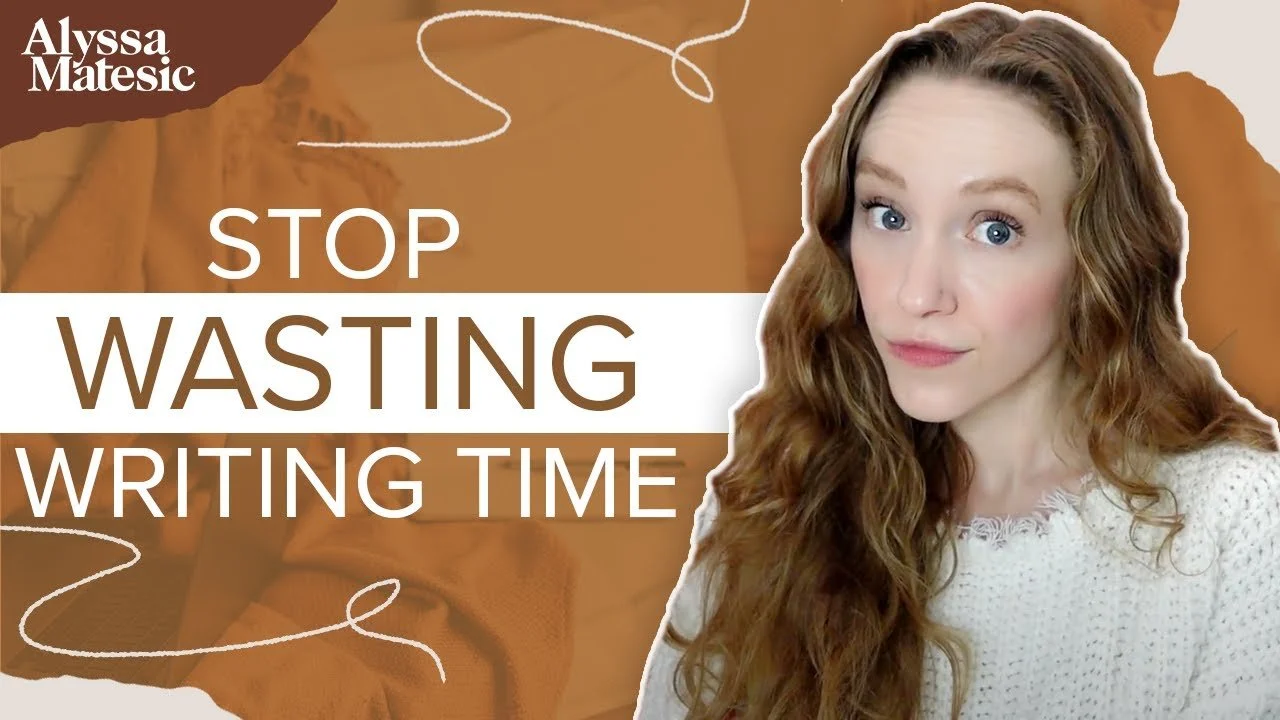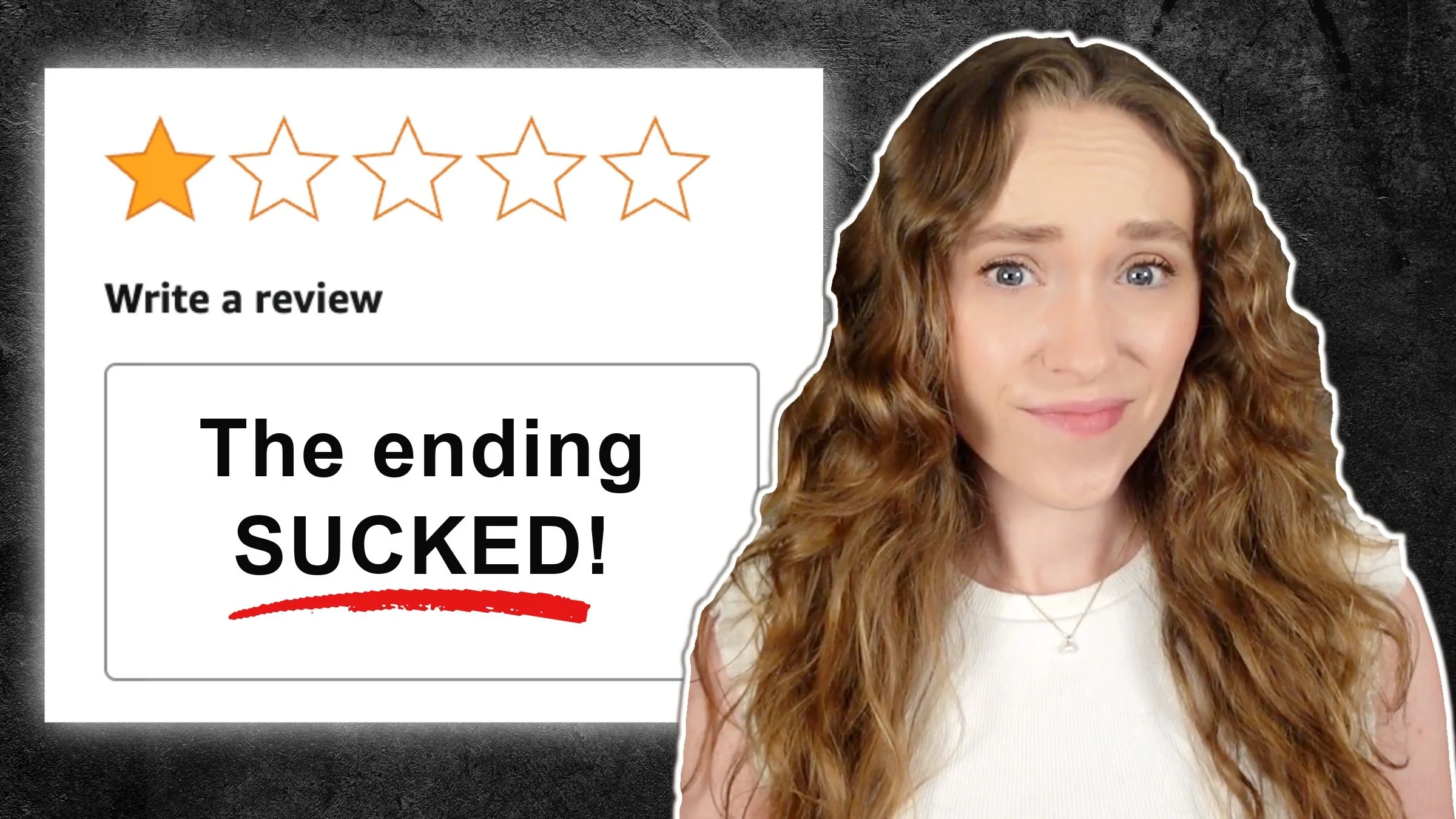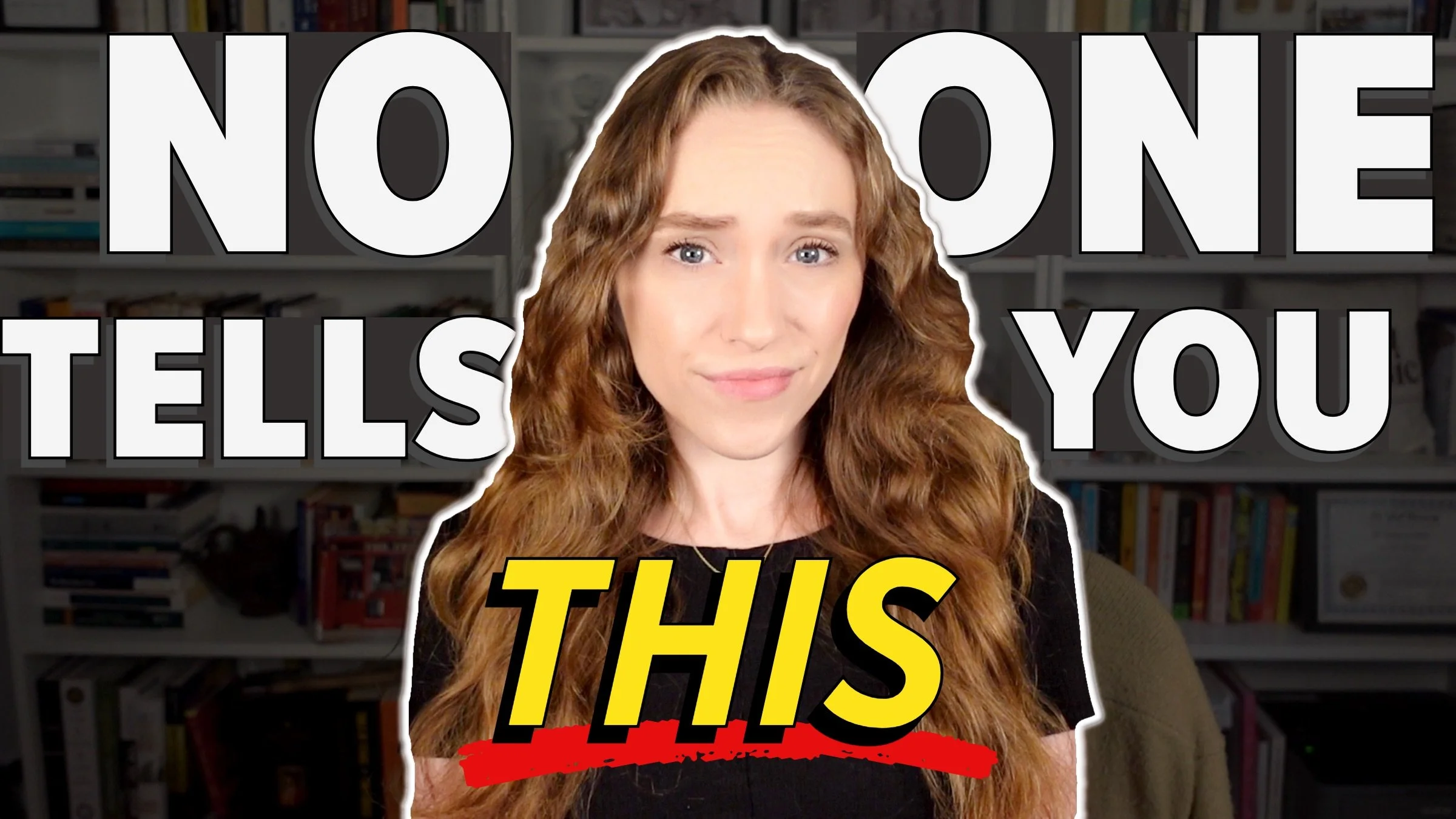How to Write Without Distractions: 5 Common Writing Distractions (And What to Do Instead)
HIT PLAY OR READ THE POST BELOW:
Writing is a hard, introspective and sometimes painstaking act. When you sit down to write your story, sometimes it might feel a lot easier to do something else entirely. Have you ever fallen into the trap of telling yourself that you're going to write for a predetermined amount of time, and then you get sidetracked and all that time has suddenly flown by, and your writing session is over, but you haven't gotten a single word down on the page?
This is for any writer who struggles to use their dedicated writing time productively or who finds themselves getting sidetracked and falling victim to common writing distractions. Today I'm going to share how to write without distractions by pointing out the biggest time-wasters that I see writers fall into. I’ll go over why that is not a good use of your time when you are trying to dedicate yourself to writing and what you should do instead to redirect that energy into something that is going to be much more valuable.
5 Common Writing Distractions for Novelists – And How to Beat Them
Writer Distraction 1: Mocking Up Book Covers
One of the most common writing distractions is spending your time mocking up book covers. The cover is the face of your book, and it means a lot to many writers. There's absolutely nothing wrong with that! Maybe you even have started thinking about the cover as you're drafting the book before it's even done.
If you have some level of Photoshop ability, you might be tempted to spend your time mocking up potential covers for your book. I totally understand why you might do this — it gives you a little bit of inspiration, it's fun to think about the cover of your book, and it might give you some motivation to keep writing if your book has a face that you can envision on the shelf one day.
That being said, it is not really a good use of your time, especially in the drafting phase of your book. Ultimately, the book still needs to get written, and that should take precedence and priority over other projects, like coming up with the cover — which ultimately is going to be part of the process later down the line, especially if you are pursuing traditional publishing. In that case, you are going to have a dedicated book cover designer work with you. So, if your goal is to get published by a traditional publisher, then it really isn't a good use of your time to mock up covers now when it is actually going to get redesigned by a professional later on. Unfortunately, if you send a cover with your query materials when you are reaching out to literary agents, it can sometimes come across as a bit amateurish because literary agents understand that you are going to have a professional cover designed later.
And remember that those professionals who design book covers are trained in what is going to be eye-catching and appealing to readers and generate sales. That is the goal the book cover at the end of the day — it’s a marketing tool. I feel like authors often overlook this when mocking up their own cover. Maybe you are simply mocking up the cover in line with your own aesthetics, but you're not really taking into account what readers are going to be attracted to or what the genre expectations are for that type of book, which are important, because if the cover doesn't appeal to readers, they're likely not going to buy the book.
Even in the case of self-publishing, I do recommend investing in a professional cover designer because again, they are going to bring a level of polish to the cover. They understand what other successful covers look like and how to make your cover stand out among all of the published books online that someone is browsing. You want to make sure your cover looks really high-quality, and because it is the face of your book, it is a worthwhile investment, in my opinion.
It is not a worthwhile investment, however, for you to spend your valuable time that you could spend on the manuscript on the cover instead if that is not your specific area of expertise. Now, if you're a professional designer, then maybe you can design your own book cover, but unless that is the case, I would steer you away from that.
What to Do Instead:
If you’re trying to write but keep getting distracted by thoughts of your book cover, I recommend instead putting together a collection of other covers that you like, especially that are in your own genre or category. You can even create a mood board or collage of sorts to then present to your professional designer that you work with later on, whether you go with self-publishing or traditional publishing.
Writer Distraction 2: Obsessively Proofreading
The next thing that I see writers waste their time on is proofreading over and over. Now, it is essential for you to self-edit and read over your manuscript. You are likely going to do so several times, if not close to a dozen times. This is going to help you produce a polished draft.
But, as you are reading through your own manuscript and self-editing, I don't want you to focus so much on proofreading little typos and grammar mistakes so much as you are thinking about bigger-picture elements, like pacing, character development, etc. When you're self-editing and revising, especially at the early stage, proofreading isn't really necessary or useful because you as the author are actually too close to the manuscript to catch those tiny sentence issues. Or maybe it's a grammar rule you're not even aware of, and therefore when you spend your time proofreading your own work, you're just going to continue to overlook that mistake. You need an external proofreader to catch all of the errors in your manuscript anyway, so as you are self-editing and revising, focus on the things that you are in complete control of and those elements that are up to you: character, plot, world-building, etc.
Remember that a true proofread is going to ideally come from an external set of eyes — someone who is trained in that specific skill. It's very helpful to have another set of eyes on the manuscript at the proofreading stage because they're going to come at it totally fresh with no preconceived notions about what the sentence should say or what it should sound like.
What to Do Instead:
Instead of going through and proofreading your manuscript over and over and over, put together an editing plan of action. First, is your book really ready for proofreading, or are there still more developmental edits that need to take place to get your book to the next level and elevate it from a story perspective? Have you gone through a developmental edit yet or a big-picture critique, like an editorial assessment or a manuscript critique? If not, you definitely want to start there. I think of editing like a funnel, where you want to start with the big-picture developmental edits, then go through to line edits, copy edits and finally proofreading.
So, unless you've gone through all of those other editorial phases, it is likely not time for proofreading yet anyway because you're going to end up changing a lot of the sentences through developmental editing, copy editing and line editing. Fixing all of the typos right now is redundant because you're still going to change so much in the manuscript and will end up having to fix new typos anyway.
Now, if you have thought about the editing funnel and your editing plan, and you are ready for proofreading, then instead of going through it yourself, think about reaching out to external editors who are trained in proofreading and getting some quotes from them. Or, you could work with someone who you trust who has that specific skillset. Any set of eyes that are not your own is likely going to be better than you proofreading because you know the manuscript too well and are probably going to gloss over mistakes.
Writer Distraction 3: Doomscrolling #WritingCommunity Posts
Learning how to write without distractions means limiting your social media browsing time. The writing community is extremely active across various social platforms, especially Twitter, Instagram and TikTok, where there are subcategories of BookTok and WriterTok.
This is amazing for feeling seen, getting support from others going through the same experience as you and even sharing ideas or getting critiques. It can be a great way to feel like you're not alone on this writing journey, which so often can feel lonesome. I absolutely love the writing community — don't get me wrong. However, I can see where it goes wrong if writers spend too much time doomscrolling posts and get down because of it.
Doomscrolling posts among the writing community can quickly become unproductive, especially if those posts make you feel bad about your own writing or where you are at on your journey. For instance, you might see someone in the writing community talk about a certain technique that they hate, and you might then feel bad because you use that writing technique. Or they might talk about a trope or a cliché that they hate, and then you feel bad because you've used that trope or cliché. Or perhaps you see posts of people announcing that they are going to get published or that they got a literary agent, and then you feel bad because maybe you just got a ton of rejections and you're not there yet. This applies especially to those who are on the querying journey, as the #amquerying hashtag is extremely active, especially on Twitter.
If you find yourself spending a lot of time on social media browsing writing community posts, I want you to take a moment to step back and ask yourself, “How do I feel when I'm engaging with these posts? Are they helping, or are they hindering my writing and publishing journey?” If they're helping, you're good to go and continue to build that community, maybe even connect with specific people on these platforms. But if they are making you feel bad, then maybe it is time to take a step back.
What to Do Instead:
What I recommend doing instead of doomscrolling writing community posts is trying to form genuine connections with writer friends. This could be a critique partner or a beta reader, it could be someone who's local to you who's also interested in writing, or it could be someone you met online who's also writing in your genre. This way you will still have that sense of community and camaraderie with someone more on an individual level, and you don't have to necessarily scroll through all of these posts or these threads that might be giving you bad energy.
Down the line when you publish, it will be important and helpful to have writer friend connections because they are people who could advocate for your book in the future, even potentially promote it or give you a blurb or a review, so it always helps to form those one-on-one connections.
Writer Distraction 4: Chasing Shiny New Story Ideas
The next big writing distraction that many writers fall into is chasing the shiny story idea. Many writers find themselves perpetually drawn to new idea after new idea after new idea, such that they have ten half-finished manuscripts and not a single completed one. Now, an important note here is that I genuinely do not believe that chasing a new story idea is always a time-waster. In fact, working on a different story can actually give you rejuvenated energy for your work in progress that you have taken a pause on, so this is not always a time-waster.
However, you have to be very careful with how much time and energy you are giving that new project versus another project. The key is to ensure that you do eventually come back to that first work in progress if you are committed to seeing it through. Or, if you decide you do want to just go head-first into the new story idea, go right ahead — you had this burst of creative energy, after all — but see that one all the way through.
What to Do Instead:
At the end of the day, if you do want to get published, see your story out in the world and present it to readers, you are going to have to finish a draft one way or another. So, I would encourage you to try to be a bit disciplined with deciding for yourself which story you are going to see through to the end. I recommend giving yourself the space to at least explore and tinker with that new idea if you feel so compelled, but maybe put some bounds around it.
For instance, say you have a dedicated writing time slot of one hour. Maybe spend the first 30 minutes exploring the new story idea, and then spend the last 30 minutes returning to the work in progress that has been in your drafts for a while. Then, after that session, try to think about where your head is at creatively and which story you want to see all the way through. Which one are you feeling the most drawn to, and which one do you feel the most passionately about at this time?
Writer Distraction 5: Getting Feedback from the Wrong Sources
The final way I see writers getting distracted is by soliciting feedback on their work from the wrong sources. When it comes to getting feedback, quality always trumps quantity. And I do want you to get feedback on your story — I think it is critical to you developing as a storyteller, and it is critical to ensuring you tell the best version of your story possible.
However, I often see writers end up wasting their time because they have engaged in a feedback session with someone that's ultimately not helpful to them. So, when you are ready to ask for feedback on your story, I want you to be very diligent in making sure you are asking the right people. Don't let just anyone read your story and give you critique because if someone comes back to you and gives you very unhelpful feedback, then that just wasted your time — and wasted their time. At worst, it could actually waste even more time on your end if it confuses you and you spend all this time trying to decipher what they meant and trying to figure out how to implement this feedback that's ultimately just not even going to be helpful.
I often see writers ask their family or friends as the first people to read their story, but more often than not, what is going to happen here is that they're just going to tell you that they liked it or give you some other positive feedback because they don't want to hurt your feelings. I'm not saying you can't share your story with friends and family, but I want you to be very clear in what you expect from them. If you do just genuinely want to share it for the sake of sharing, that's great — go ahead!
But if you do genuinely want a real critique from them, then you need to set that expectation from the beginning. You need to make sure that the person you're asking actually has the skillset to give you helpful feedback — for instance, if they are a really voracious reader or they are an editor of some kind — and you want to make sure that they will actually be honest with you.
Other times, I see writers connecting with people who they've met online in a beta reader or critique partner arrangement, but they don't know this person personally. That's not a problem, but in those cases, I want you to make sure that this is a good editorial match for you, and I want you to talk to that person about how they are going to deliver their feedback. I want you to ideally read some of their work to get a sense of if their writing aligns with the type of writing you want to produce. If their skillset is vastly underdeveloped compared to yours, they probably aren’t going to be a good critique partner.
What to Do Instead:
When you are soliciting feedback, there is going to be some level of the unknown, no matter what. You're not going to know until you see the feedback if it's ultimately helpful or not, but doing your research upfront is going to help you improve the chances that the feedback is going to be helpful and productive on both ends. So, rather than just soliciting feedback from anyone and everyone, I recommend taking your time to vet the people you are asking. Ask questions about how you are going to receive the feedback, and set expectations for the type of feedback you are looking for. Are you looking for overall help with the main story elements, like plotting and character? Or are you asking for more of a high-level read, like whether they liked it or whether it matched their expectations for the genre?
If you are working with a professional editor, you will absolutely want to review all of their credentials and the list of the prior projects they have worked on to make sure you are a good editorial match. That is going to help you ensure the feedback is helpful.
I hope these tips helped you understand where you might be falling into common writing distractions and how you can repurpose that time and energy into something that is ultimately more productive on your writing journey. If you are able to recognize those habits in yourself, it's also going to make you a much more productive writer.
Thanks so much for reading and happy writing!






